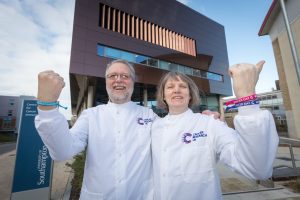
Scientists at the Centre for Cancer Immunology have been awarded ┬Ż2.2million to develop the next generation of targeted therapy used to treat some cancers.
Antibody-drug conjugates (ADCs) are a new form of treatment that can recognise and target just cancerous cells ŌĆō and then make them kill themselves.
While the development of ADCs has been an exciting leap forward when it comes to cancer treatment ą they currently feature in around 60 clinical trials for patients worldwide ą the downside is dosage, as the drugs can be quite aggressive. In some cases, they have proved simply too toxic for patients, or have caused negative side effects and had to be withdrawn.
However, the grant from Cancer Research UK, will support Professor Sally Ward and Raimund Ober, who have recently joined the Centre for Cancer Immunology from Texas AM University, in a new research programme that will find ways to better engineer ADCs. The study will also give a clearer understanding of how they are working in the body, enabling the team to develop new drugs which are less agressive but just as effective in shrinking a tumour.
News of the grant, which will fund this specialist immunotherapy research project over the next five years, can be revealed today (Monday Feb 4) as people around the globe unite to mark World Cancer Day.
Professor Ober said: ŌĆ£Science is becoming a very expensive business. Cancer Research UK has been responsible for a significant part of the funding we are receiving, and we are extremely grateful not only to the charity, but to each and every person who has donated money to fund research.
ŌĆ£This grant is critical in enabling us to come to Southampton and do the work we really want to do ŌĆō without it this really would not have been possible.ŌĆØ
The University of SouthamptonŌĆÖs international reputation for translational research and the new Centre, were the major draws for Professors Ward and Ober when deciding to return to the UK.
The Centre was funded through a ┬Ż25m fundraising campaign by the University of Southampton, which hit the target last World Cancer Day, six months ahead of schedule.
Professor Ward said: ŌĆ£The attraction of Southampton is that there is this whole team of scientists and clinicians working there, fully integrated in one centre, in a really impressive building.
ŌĆ£Aside from the grants that made it possible, the prospect of being able to join this exciting team of great researchers and actually see how the results are being translated from bench to bedside was a big appeal.ŌĆØ
They have already recruited a number of key staff to work with them in Southampton on this and other key projects ŌĆō and they hope to be fully up and running with a 15-18 strong lab group soon.